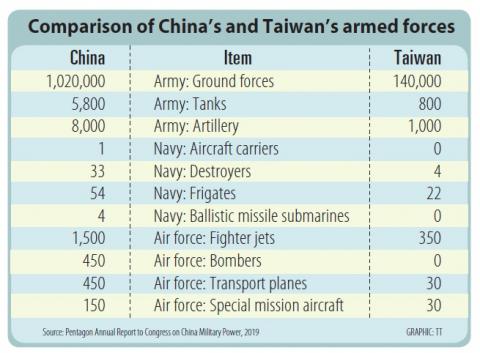Analysts and legislators urged the government to step up the nation’s asymmetric warfare capabilities, after the US Department of Defense issued a report on China’s military capabilities.
The report, released on Thursday, said that the west and northwest of Taiwan are in range of the People’s Liberation Army’s (PLA) air defense missiles, Institute of National Defense and Security Research analyst Su Tzu-yun (蘇紫雲) said.
The Ministry of National Defense’s decision to replace Northrop F-5Es at Chihhang Air Base in Taitung with F-16Vs is vindicated by the report’s findings, he said.

Basing Taiwan’s most advanced tactical aircraft at Chihhang would put them beyond the reach of Chinese surface-to-air missile fire during takeoff, Su said.
The military should also enhance its arsenal of surface-to-air and shore-based anti-ship missiles that, in conjunction with Japan’s anti-ship missile batteries at Miyakojima in Okinawa Prefecture, could block the PLA’s access to the Pacific from the first island chain, he said.
The report identified three possible forms of Chinese aggression toward Taiwan: large-scale missile attacks, limited attacks by precision-guided munitions or an amphibious assault, Chinese-language Military Link Magazine editor-in-chief Chen Wei-hao (陳維浩) said.
No nation has ever surrendered to missile attacks alone, so Beijing could well find that it has no alternative but to stage an amphibious assault if it wishes to bend Taiwan to its will, Chen said.
Mounting an amphibious invasion of Taiwan could be a daunting prospect for China, as such military action risks domestic stability and could lead to armed intervention by other states, he said.
While China is unlikely to achieve victory with missile fire alone, the improved range of its modern missiles poses a “huge threat,” as the military’s plans to escape missile fire by moving units east could be rendered obsolete, Chen said.
“The urgent task is conceiving a response that would actually implement the principles of asymmetric warfare, especially with regard to disrupting the communist forces’ ability to push supplies and reinforcements to the front,” he said.
Regarding the report’s conclusion that the PLA could commit its sole aircraft carrier to battle, Chen said the Liaoning has more propaganda than combat value.
Accounting for maintenance cycles, a minimum of three carriers is needed to make a strategic impact, Chen said.
Chinese naval aviation would not pose a serious threat for the next 10 to 15 years, he said.
Democratic Progressive Party Legislator Wang Ting-yu (王定宇) said the report suggests that the US’ armed forces are actively preparing to defend the region.
Taiwan’s military defenses are acceptable, but the military should keep improving the mobility of its units and therefore their survivability, he added.
Ministry spokesman Major General Chen Chung-chi (陳中吉) said that the nation’s armed forces continue to observe trends and exercise control over the airspace and maritime zones around the nation.
“The military will, as the president has said, yield not an inch of the nation’s sovereign territory or an iota of our freedoms and democracy,” he said.

NATIONAL SECURITY THREAT: An official said that Guan Guan’s comments had gone beyond the threshold of free speech, as she advocated for the destruction of the ROC China-born media influencer Guan Guan’s (關關) residency permit has been revoked for repeatedly posting pro-China content that threatens national security, the National Immigration Agency said yesterday. Guan Guan has said many controversial things in her videos posted to Douyin (抖音), including “the red flag will soon be painted all over Taiwan” and “Taiwan is an inseparable part of China,” while expressing hope for expedited “reunification.” The agency received multiple reports alleging that Guan Guan had advocated for armed reunification last year. After investigating, the agency last month issued a notice requiring her to appear and account for her actions. Guan Guan appeared as required,

Japan and the Philippines yesterday signed a defense pact that would allow the tax-free provision of ammunition, fuel, food and other necessities when their forces stage joint training to boost deterrence against China’s growing aggression in the region and to bolster their preparation for natural disasters. Japan has faced increasing political, trade and security tensions with China, which was angered by Japanese Prime Minister Sanae Takaichi’s remark that a Chinese attack on Taiwan would be a survival-threatening situation for Japan, triggering a military response. Japan and the Philippines have also had separate territorial conflicts with Beijing in the East and South China

A strong cold air mass is expected to arrive tonight, bringing a change in weather and a drop in temperature, the Central Weather Administration (CWA) said. The coldest time would be early on Thursday morning, with temperatures in some areas dipping as low as 8°C, it said. Daytime highs yesterday were 22°C to 24°C in northern and eastern Taiwan, and about 25°C to 28°C in the central and southern regions, it said. However, nighttime lows would dip to about 15°C to 16°C in central and northern Taiwan as well as the northeast, and 17°C to 19°C elsewhere, it said. Tropical Storm Nokaen, currently

PAPERS, PLEASE: The gang exploited the high value of the passports, selling them at inflated prices to Chinese buyers, who would treat them as ‘invisibility cloaks’ The Yilan District Court has handed four members of a syndicate prison terms ranging from one year and two months to two years and two months for their involvement in a scheme to purchase Taiwanese passports and resell them abroad at a massive markup. A Chinese human smuggling syndicate purchased Taiwanese passports through local criminal networks, exploiting the passports’ visa-free travel privileges to turn a profit of more than 20 times the original price, the court said. Such criminal organizations enable people to impersonate Taiwanese when entering and exiting Taiwan and other countries, undermining social order and the credibility of the nation’s